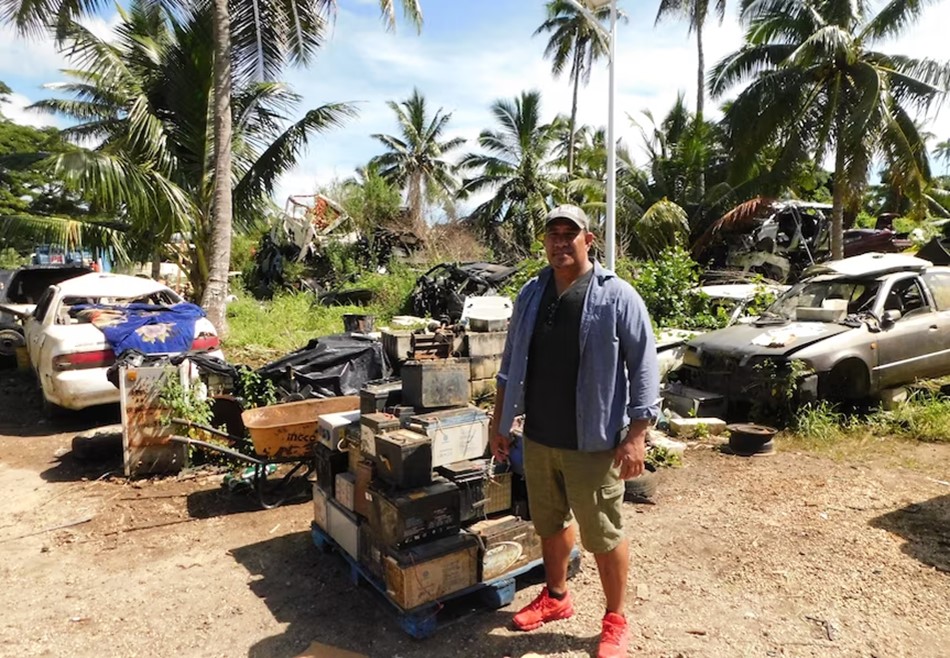
How the Kingdom of Tonga is dealing with the scourge of End of Life Vehicles
6 August 2024, Funafuti Tuvalu - The mountain of End of Life Vehicles (ELVs) is an imposing challenge for the Kingdom of Tonga.
Statistics show that the main island of Tongatapu has accumulated more than 30,000 ELVs over the years – and with more cars being imported on an annual basis, this number is quickly multiplying, with consequences on the environment.
“If we don’t dispose these vehicles properly, the consequences on our environment and future generations are dire,” lamented Mr Saimone Vuki. “We can’t ignore this.”
The good news is that through the work of Mr Vuki, of the Tonga Recyclers Association (TRA) and their partners, the Kingdom of Tonga has already taken active steps to reduce the problem.
“ELVs contain hazardous components such as lead batteries, refrigerant gases, mercury, and mechanical oils,” Mr Vuki said. “They also contain persistent organic pollutants and other brominated flame retardants in the textiles and foams used in artificial leather for seat covers and interior lining, as well as added to hard plastics, electronic parts, cable casings, shrink plastics, tapes, and other vehicular components.”
Mr Vuki was speaking on the second day of the Fourth Clean Pacific Roundtable (4CPRT) in Tuvalu where more than 200 delegates are gathering to advance the work towards a Cleaner Pacific. He was amongst speakers during the Resilient Waste, Sustainable Future parallel sessions, speaking on the topic of the Role of the Private Sector in ELV Management.
“Without proper dismantling and treatment of hazardous components, ELVs may cause soil and groundwater pollution. If open burning takes places, unintentionally produced POPs, dioxins and furans, are also emitted to the atmosphere,” he said.

With this in mind in 2020, Mr Vuki became very concerned that there was no officially designated site for car waste in the country so he started actively collecting scrap cars from around the island and moving them onto eight acres of his own land, where thousands of cars are stacked today.
“The situation really changed my life, I wanted to make a difference and ensure we act to protect our environment and our future generations.”
Mr Vuki also started the Tongan Recycling Association, an organisation made up of individuals and private companies who support reducing, reusing, and recycling waste in Tonga.
"Our mission is to try and remove the ELVs from the homes and bring it to one place," said Mr Vuki. To date, there are at least 5,000 abandoned vehicles on Mr Vuki’s ELV yard.
But there is much more work to be done and at the 4CPRT, Mr Vuki advocated for collaboration and more support from potential partners and the government to ensure the mission continues.
He noted that the private sector needed recognition, assistance, expertise, technology and encouraged public private donor partnerships to continue this work. Amongst those partners are Tonga’s Environment Department and Tonga’s Waste Authority Ltd.
Manager Administration and Special Projects for Waste Authority, Ms Lola Liava’a Tonga said WAL, authorised by the Government of Tonga to do all waste collection and landfill management, has been working hard to seek support to address the issue.
“We are aware that the issue has worsen through the years with no proper process in place, mainly because of the lack of capacity and funds for proper infrastructure/tools to dispose them,” said Ms Tonga.
“WAL approached the Government of Japan through the Embassy of Japan in Tonga, seeking support to deal with end of life vehicles after the volcanic eruption in 2022. WAL was approved $4million to fund proper equipment and heavy machineries to collect and compact scrap vehicles.
“We are currently waiting on these equipment which should arrive in Tonga this month. Our aim is to start collection and clean the vehicles off the environment, compact and seek markers overseas to send them to.
“We will implement this service in not only the main island of Tongatapu but also the outer islands. The priority for those of us who are in operation of all things waste is to clean these types of waste off our environment, dispose them safely and have proper process in place to provide a service that's consistent.”
SPREP’s Hazardous Waste Management Adviser, Mr Joshua Sam, said the challenges in the Kingdom of Tonga in dealing with ELVs are quite common across the Pacific.
At the CPRT, the idea is to explore diverse approaches to end-of-life vehicle management through the lens of different economic and geographical contexts, highlighting innovative practices, challenges, and actionable strategies suitable for adaptation in Pacific countries.
Pacific countries will also look to advocate at the international level for the introduction of Extended Producer Responsibility into the automotive industry to ensure that car manufacturers are responsible to assist with end-of-life vehicle management in the region, to address the unique circumstances of the Pacific region.
The Fourth Clean Pacific Roundtable (CPRT) facilitated by the Secretariat of the Pacific Regional Environment Programme (SPREP) is hosted by Tuvalu from 5 – 9 August 2024.
The Roundtable is intended to provide a vehicle to disseminate outcomes, promote regional collaboration and resource complementarity, and expand networking opportunities to assist Pacific Island countries and territories in the delivery of safe and sustainable waste management practices. It will also prevent pollution-related issues that impact the health of the ocean and communities within the region.
It is attended by the Cook Islands, Fiji, French Polynesia, Kiribati, Marshall Islands, Nauru, Niue, Palau, Papua New Guinea, Samoa, Solomon Islands, Tonga, Tuvalu and Vanuatu.
For more details and the programme, click: https://www.sprep.org/4th-clean-pacific-roundtable
Distribution channels: Environment
Legal Disclaimer:
EIN Presswire provides this news content "as is" without warranty of any kind. We do not accept any responsibility or liability for the accuracy, content, images, videos, licenses, completeness, legality, or reliability of the information contained in this article. If you have any complaints or copyright issues related to this article, kindly contact the author above.
Submit your press release